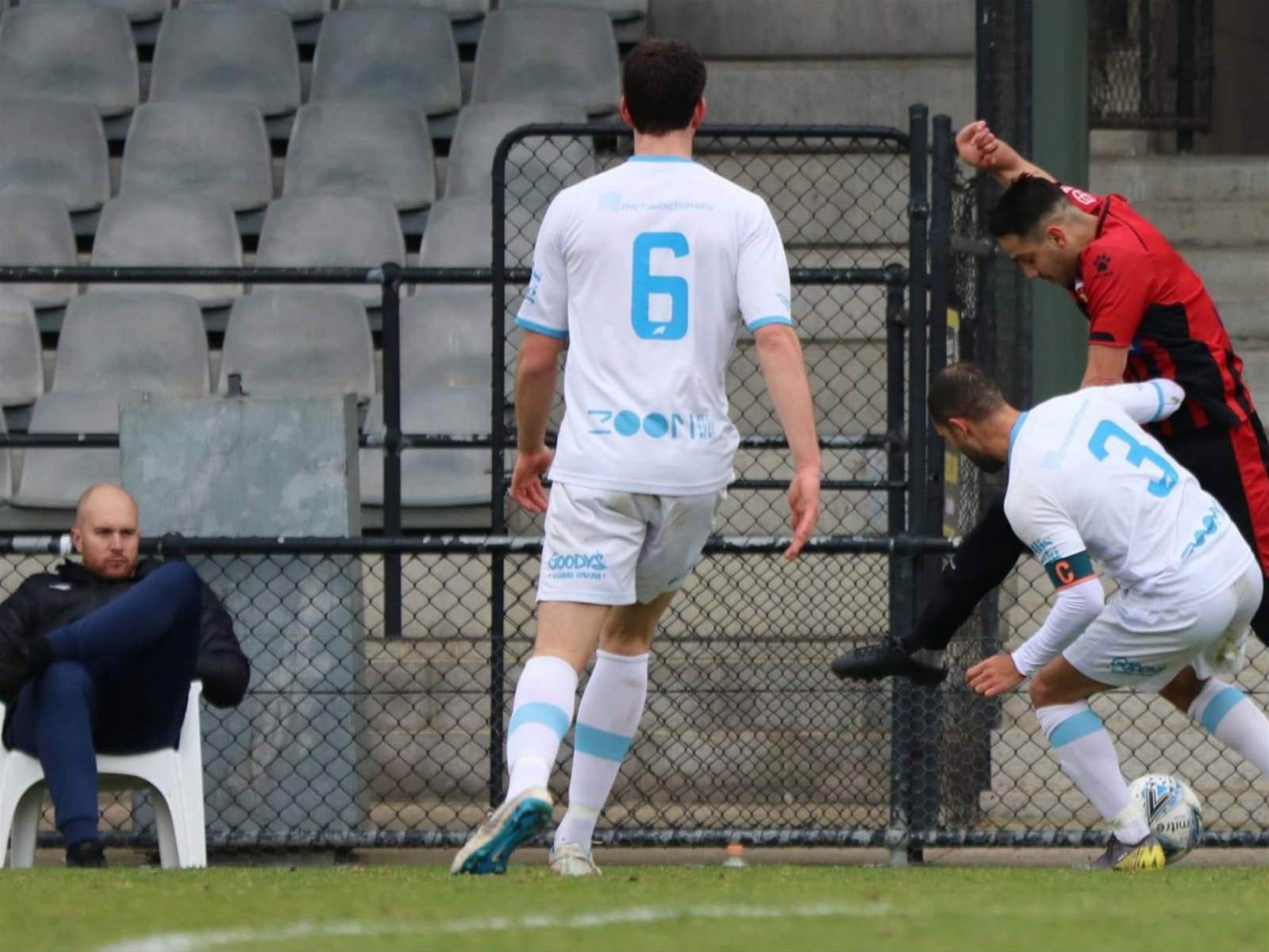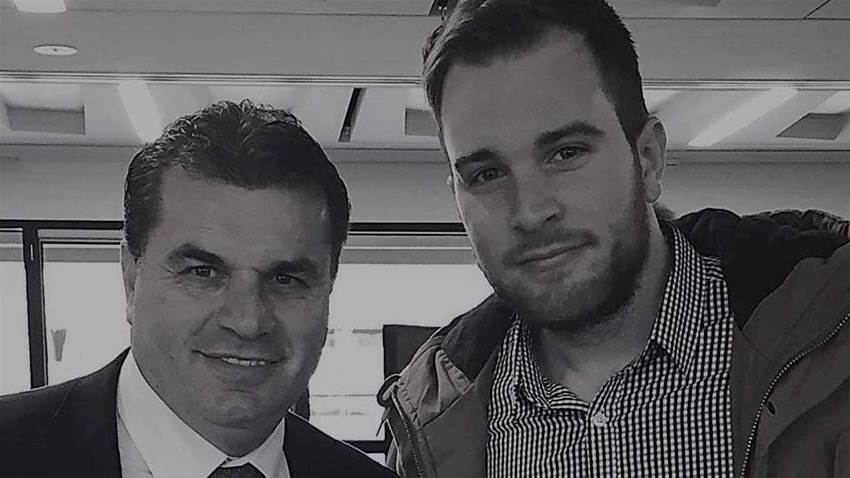Digital transformation is rewiring our lives. And if you delve deeper youthful football coaches are emerging, drawing on data, AI and digital insights to give their coaching an edge. We meet one such coach in Melbourne.
Riccardo Marchioli has an emerging reputation inside football.
At just 27, he was appointed head coach at progressive Victorian NPL club Brunswick City.
He's now 29 and still in charge at the progressive, semi-pro club, where he oversees data and tactical analysis of his players and opposition while fostering an exhilarating, possession-based high-energy football.
WATCH Marchioli's City are reaping the benefits of a data-inspired coach who has a clear philosophy
It's all rather Bielsa-esque (Leeds United’s manager Marcelo Bielsa, a tactical master who is also fixated on analysis and data as part of his high-energy style of football at the newly-promoted Premier League club).
Marchioli represents the next generation of Graham Arnolds, Kevin Muscats, and Ange Postecoglous.
A generation more likely to be across player data, algorithms, AI, and machine learning, and with experience coaching both genders.
“The future of coaching I believe will see combining being a head coach with the analysis,” says Marchioli, a coaching and technical director veteran of male and female teams for 14 years.
“The coach of the future will have to do both anyway. There’s a lot of data analytics and tracking that are coming into the game.
“Whether you’re an assistant coach or a head coach of the future, you’re going to need a very thorough understanding of digital skills and data.

“The biggest software coming to the fore is tracking data and being able to quantify that data with metrics like expected possession value (EPV).
“Those are going to be some of the biggest data sets that will intersect with the sport.
“We see it in basketball. And we’re seeing EPV in European football.
"Mixing tracking data with machine learning and specifically created algorithms to produce a live picture of what some call EPV or pitch control, depending on how it’s used, is the future."
Liverpool FC for example have publicly outlined how they use EPV at the Premier League champions.
“In the future at clubs, you’ll have people responsible for interpreting that data,” Marchioli noted.
“And this is where the analysis skill set will come in handy for a head coach.
“Because a head coach will need to be across all these things in order to do their job effectively as possible at the highest level.
“That data can give you a live picture of certain spaces that are being controlled and certain values around actions that take place in a game.
“Whether a move or a pass is contributing towards scoring goals or preventing goals
“That’s the bottom line. You want to score more goals than the opponent and prevent them from scoring within your own style.
“That technology and data are giving coaches the ability to make more informed decisions.
“But you still need the knowledge and insights to take that data and make a decision in real-time based on the human beings in front of you.”
As a head coach, Marchioli isn’t just talking. He's actually doing.
Here's a great example.
Last year he put together his own data to produce an EPV model at Brunswick.
“We used that data to show the players that we were on the right track, even though we’d hit a slump and that data suggested that the team will regain the form and results," he says.
“It helped. It showed one of the applications of data and analytics.

“And machine learning with data sets will get more and more accurate as the algorithms get more detailed.
“There are algorithms and code being written every day to improve the machine learning algorithms.
“It goes back to making more informed decisions.
"It’s not the full picture with emotional scenarios in sport. Sometimes the data doesn’t tell the full picture.
“But having more informed conversations with your players beyond intuition, instinct and memory can make a difference.
“It’s very important for a head coach to keep abreast of all this AI and data revolution.
We’re witnessing the digital transformation of the sport during COVID.
READ How data and the digital transformation is influencing sport
Not just streaming, but automating marketing, geo-targeted advertising, data insights on fan behaviors, stadia facilities, COVID protocols, and chatbots are all part of the broader digital transformation of clubs.
The likes of Marchioli, 32-year-old Ben Cahn (Olympic FC head coach in Brisbane who was a head coach aged 25), Newcastle's Keelan Hamilton, and others are developing both coaching and data insights to supercharge their careers.
Combining for a new hybrid type of coach: digitally savvy, progressive in their player management and tactical approach while eager to embrace technology and data.
In fact, Australia is producing an eye-catching group of digital analysts and coaches working away on laptops in the background across Australia.
And Marchioli is happy to name his cohorts who are at the cutting edge of data and football in Australia.
“Vince Ierardo at Western United, an analyst. His role at Western is a big inspiration,” says Marchioli.
“George Apostolidis, a performance analyst at Melbourne City, he’s an ex-player of mine.
"He worked with Arthur Papas in Saudi and in the A-League. He flys under the radar but he was the one who gave me a crash course on SportsCode.
“And there’s Kate Cohen, now at Macarthur and formerly with the Matildas - we used to write at Leopold Method.
"She’s someone who is starting to gain a bit of respect on social media… she’s unbelievably under-rated."
Marchioli himself is getting known on LinkedIn and social for his tactical analysis of A-League clubs.
These younger coaches and analysts have literally grown up in the digital era and are innately more data, digital and social media savvy.
Marchioli, for instance, combines the head coach role with the job of the analyst.
Like Arthur Papas 10 years ago, Marchioli hasn’t relied on a long pro playing career to elevate his coaching dreams.
He’s just got on with it and proved himself.

Papas has proved an inspiration to Marchioli as he reflected on key moments in his 14-year coaching career.
“The people that Arthur has worked alongside in places like India, Saudi Arabia, and now in Japan.
“The knowledge of the people he’s worked with has set him up for the position he’s in now with Ange [Postecoglou].
“And having Pep [Montemurro] as my technical director at the time as a 19-year-old.
"Being exposed to coaching in our state program where I worked with kids who are making it now, such as Josh Cavallo (Western), Connor Metcalfe (City) Denis Genreu (Macarthur) and former Victory and now Borussia Monchengladbach's Cristian Theoharous.
“But as a 22-year-old, my biggest leap,” he explains with pride, “was taking a Women’s Premier League side as a senior coach.”
With half the dressing room older than their coach and with a team at the bottom of the league halfway through the season, Marchioli worked his magic.
He quickly got his hands on footage from the first half of the season.
Marchioli assessed many players were largely being played out of position.
The young coach soon put some structure around the side’s shape.
He quickly found success. It was an epiphany.
“We then went on a four-game unbeaten run for a team that couldn’t seemingly score and had shipped more than 50 goals.
“We ended the season drawing with Steph Catley’s Sandringham, the eventual champions.
"It was like we’d won a final, the celebrations were bloody brilliant!
“That was the moment I sort of thought, ‘I think I’m capable of doing this.’"
Pleasingly, Yokohama Marinos boss and J-League winner Postecoglou has taken the time to email Marchioli.
It was a special moment when that popped up in his inbox.
“One sentence of encouragement from Ange can give me six months of inspiration.
"Something like that from Ange means the world."
Marchioli, whose family hails from Rome and Abruzzo, says Australia’s foreign contingent of coaches: Postecoglou, Papas, Cklamovski, Montemurro, Muscat, and Trani are inspiring.
“I definitely want to continue to be a head coach,” he says.

“For me, the perfect week is when you’ve prepared for a game and there are absolutely no surprises and you’re actually a few steps ahead.
“You have that advantage because you’ve got a level of detail and you’ve prepared in a level of detail that allows the players to showcase and to complete the roles required to the best of their potential.
“What can that knowledge when given to the players and how can that improve their game?
“Players these days want to know you’re there for them, not to just prove how smart you are.
“Players can see through you if you’re wishy-washy, and don’t have a conviction in your game plan.
“There’s a way I want how my teams play, I don’t want to change it that much.
“Eventually I do want to test myself overseas. But I’m patient ... I have a great opportunity right now with Brunswick City.
"Guys like myself and Ben [Cahn] are in this situation where we’re lucky enough to be given this opportunity at a young age.
“It takes the right people with the courage to give young people with potential the opportunity."
Marchioli wants to help Australia to win a World Cup one day.
If so, we’ll need more data-savvy and tactically astute coaches like Riccardo Marchioli if we’re ever to become a world power.
Related Articles

New Womens Coaching Association is a game changer

Could a new A-League streaming model transform football’s broadcast future?



.jpg&h=200&w=300&c=1&s=1)











